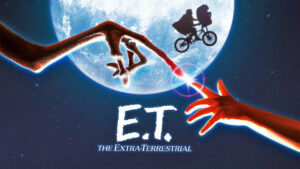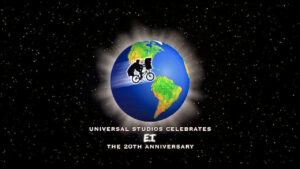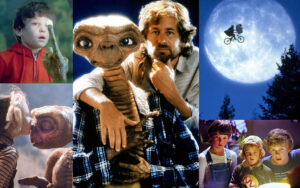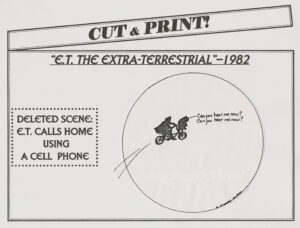This movie feature originally appeared in The Kansas City Kansan newspaper on March 23, 2002. My original artwork is included.

By Steve Crum
The rumors lie. The vulgar words have not been cut out of the 20th anniversary re-release of E. T. the Extra Terrestrial. So “penis breath” and a couple of other mildly off-color remarks made by the film’s children survive. It wasn’t a big deal in the first place, but there were publicity leaks that director Steven Spielberg, along with screenwriter Melissa Mathison, had cleaned up the language in what many consider his greatest motion picture work.
 Be that “breath” as it is, this new take on E. T. is barely changed from the original. The audios and visuals have been digitalized, although I could not discern a difference. Of course, I need to re-see the 1982 original to really compare. But there is a notable scene cut from the original release that IS noteworthy.
Be that “breath” as it is, this new take on E. T. is barely changed from the original. The audios and visuals have been digitalized, although I could not discern a difference. Of course, I need to re-see the 1982 original to really compare. But there is a notable scene cut from the original release that IS noteworthy.
The restored gem occurs as Elliot (Henry Thomas) talks on the phone as the stumpy E. T. teeters on the edge of a bathtub in the background, and soon falls in.  Elliot runs to rescue his friend, followed by E. T. wanting to remain submerged. It’s a cute, laughable scene.
Elliot runs to rescue his friend, followed by E. T. wanting to remain submerged. It’s a cute, laughable scene.
At this point, forgive me. In my haste to divulge the scoop on changes in E. T., I assumed that most of you readers have already seen the movie at least once over the past 20 years, either on screen or video. For those who are in the minority, let me fill you in.
E. T. tells the story of a 10 year-old California boy, Elliot (Thomas), who one day befriends an outer space creature hiding in his backyard storage shed. The short and harmless visitor is stranded on earth after his fellow aliens take off in their space vehicle without him. It is established early on that the outer space botanists land on earth to collect plant specimens for storage in their ship’s greenhouse.
After enticing the thing in the house and upstairs into his room (all by leaving a trail of Reece’s Pieces), Elliot soon confides with his older brother, Michael (Robert MacNaughton) and six year-old sister,  Gertie (Drew Barrymore). Together, throughout most of the movie, they keep their house guest a secret from their mom (former Kansas City, Kansas resident Dee Wallace-Stone).
Gertie (Drew Barrymore). Together, throughout most of the movie, they keep their house guest a secret from their mom (former Kansas City, Kansas resident Dee Wallace-Stone).
As government scientists zero in on the whereabouts of E. T., Elliot find that he emotionally links with the creature—with both comedic and dramatic results. Still a jaded laugh after all these years is when E. T. gets into the home refrigerator while Elliot is at school in science class. As E. T. chugs beer after beer, becoming falling-down drunk, Elliot experiences like results.
 By the time astronaut-suited scientists surround Elliot’s house (reminiscent of the home invasion in Spielberg earlier Close Encounters of the Third Kind), E. T. has learned to talk: “Phone home!” Time for Elliot and family to get their new pal back to his own planet.
By the time astronaut-suited scientists surround Elliot’s house (reminiscent of the home invasion in Spielberg earlier Close Encounters of the Third Kind), E. T. has learned to talk: “Phone home!” Time for Elliot and family to get their new pal back to his own planet.
There is a notable presence of the “Keys” character (Peter Coyote), who is shown waist down from the opening of the film, with a set of keys dangling off his belt. He is the leader of these government hunters, who are interestingly depicted as villains. Incidentally, Coyote’s character is shown full body and face at the end.
The tear-wrenching, Oscar-winning score by John Williams is as effective as ever, and E. T.’s eventual departure still grabs.
In its ending, which echoes sentiments similar to those in The Wizard of Oz, E. T. extolls the virtues of being home…and of loving one’s home. Elliot’s home has been torn by separated parents; and E. T. is separated from his own. Man’s humanity to his fellow man (or creature) is central to Spielberg’s best work—from Schindler’s List to A. I. to this genuine classic, his most popular film.
°°°°°°°°°°
GRADE on an A-F Scale: A
